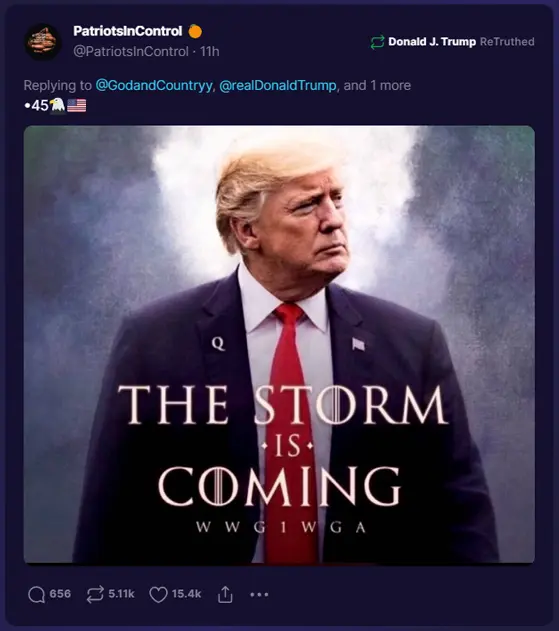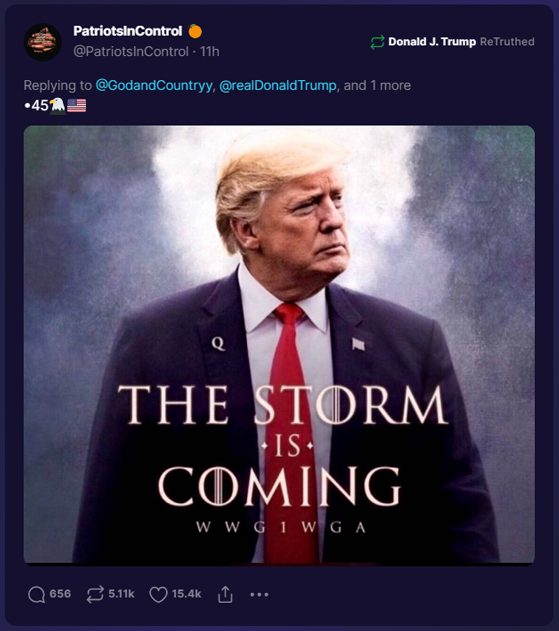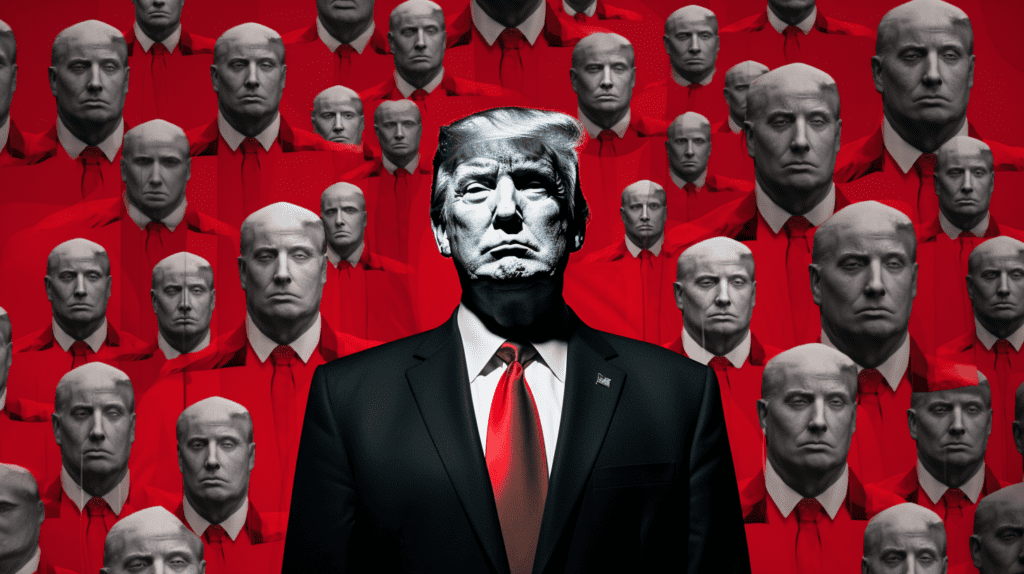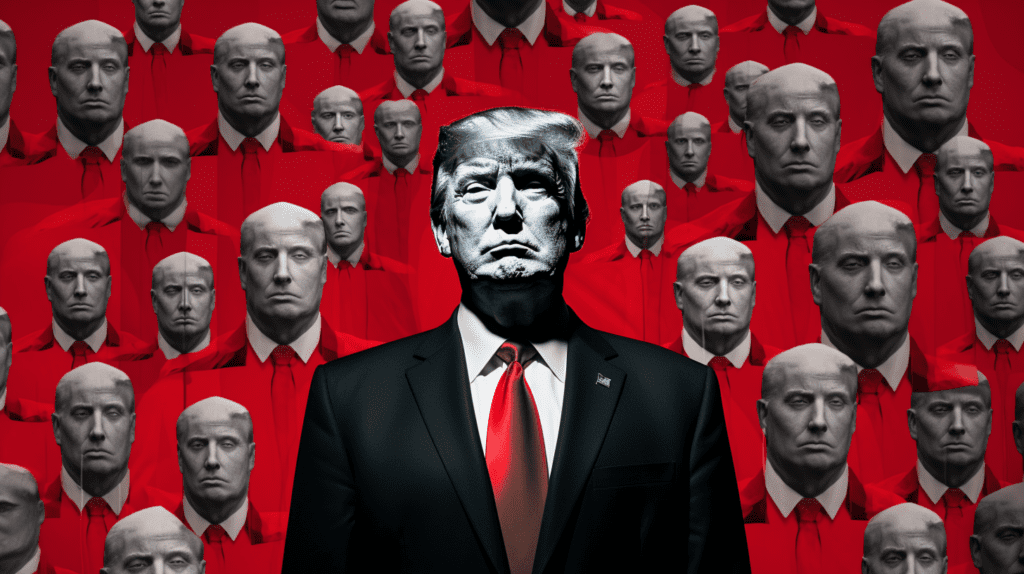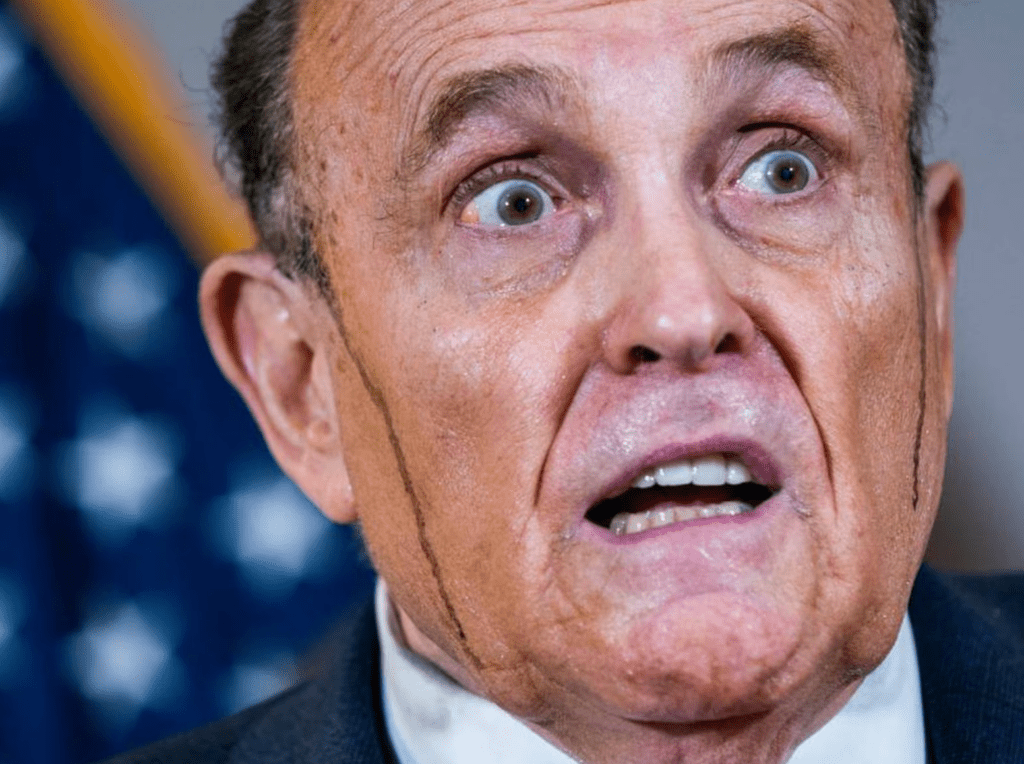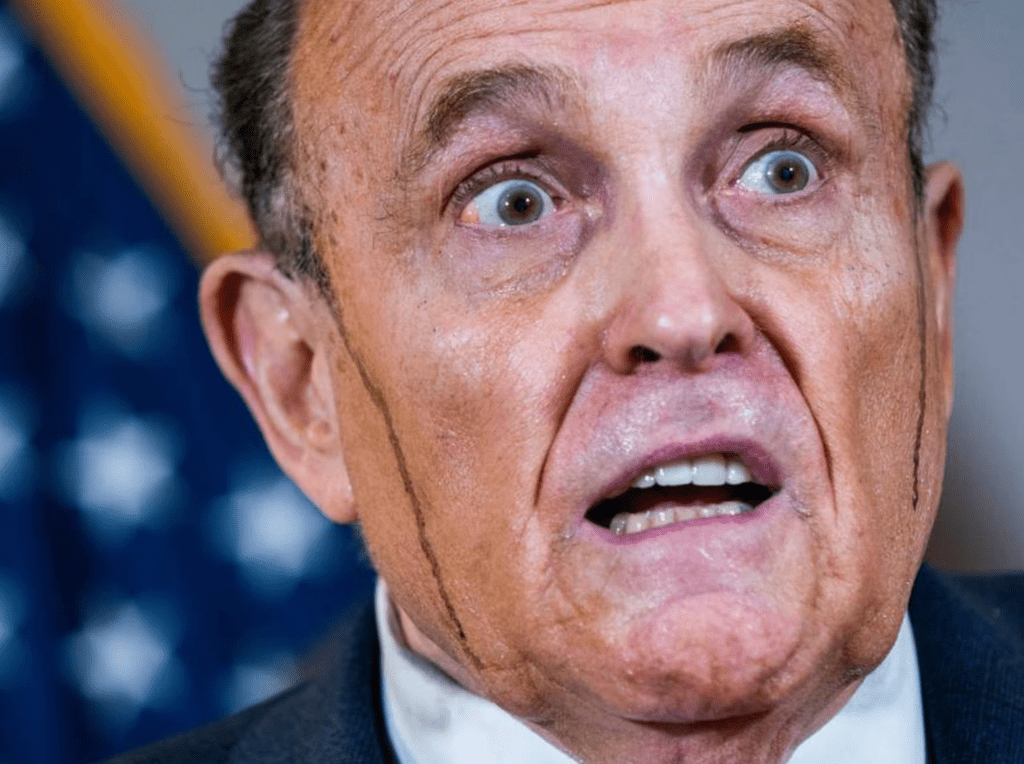The term Christian nationalists brings together a number of radical religious sects seeking to overthrow the democratic republic of the United States and installing a strict theocracy, from dominionists to orthodox Catholics to Evangelicals and many more.
They tend to believe in Strict Father Morality, and desire to establish some sort of Christian fascist theocratic state in America, under the backwards idea that the founders never intended to separate church and state — despite religious freedom and the ability to worship as one pleases being precisely one of the major founding ideals of the United States.

Christian nationalism
For more on Christian nationalism, please see the following topics:
- Christian Reconstructionism
- Dominionism
- Myth of the Christian nation
- Myth of the Lost Cause
- Strict Father Morality
Christian nationalists list
Here are some of the people and organizations involved in — or foundational to — the modern day movement to establish a Christian theocratic government in America (this is a work in progress!):
- 700 Club — Airing since 1966, the 700 Club is one of the longest-running Christian TV programs in the U.S. The show is produced by the Christian Broadcasting Network, founded by evangelist and one-time presidential candidate (1988) Pat Robertson.
- Howard Ahmanson Jr. — American businessman, philanthropist, and Christian conservative activist who has donated millions of dollars to right-wing organizations and the GOP. Ahmanson is the son of the late financier and philanthropist Howard F. Ahmanson Sr., and a supporter of the Intelligent Design movement.
- Awake 88 — A 2008 initiative sponsored by the Family Research Council (FRC) in which J.C. Church visited 2500 churches in all of Ohio’s 88 counties in an effort to turn the state red in the 2008 elections.
- Alexander Acosta — Trump‘s Secretary of Labor from April 2017 to July 2019 who resigned when new details of his unlawful “sweetheart” plea deal with Jeffrey Epstein came to light. He was known to attend the weekly White House Bible study gatherings led by Dominionist and Evangelical proselytizer Ralph Drollinger.
- Alex Azar — Trump’s Secretary of Health and Human Services from January 2018 to January 2021, who was also known to attend the weekly White House Bible study gatherings led by Dominionist Ralph Drollinger.
- Alliance Defending Freedom (ADF) — The ADF is a nonprofit founded in 1994 by James Dobson, Bill Bright, and other Christian leaders to provide legal representation and support to people and organizations facing legal challenges based on their religious beliefs. The ADF was involved in the high-profile Masterpiece Cakeshop case, defending the baker who refused to make a gay wedding cake.

- American College of Pediatricians — ACPeds is a small, socially conservative group of pediatricians founded in 2002 that has been criticized for its support of the discredited “conversion therapy” practice for LGBTQ+ youth and other views that run counter to the group’s stated purpose of promoting healthy and respectful development of children. The group is not recognized by the American Board of Medical Specialties or the American Academy of Pediatrics.
- American Enterprise Institute (AEI) — A conservative think tank based in the United States that conducts research and advocacy on a range of public policy issues. Founded in 1938, the AEI is known for its promotion of conservative social values.
- American Family Association (AFA) — A non-profit conservative Christian organization based in the United States, founded in 1977. The group has been designated as a hate group by the Southern Poverty Law Center, which cites the organization’s history of spreading false and harmful information about LGBTQ+ individuals and promoting intolerance and bigotry.
- American Family Radio Network (AFR) — A Christian radio network in the U.S.
- American Heritage Girls (AHG) — The American Heritage Girls (AHG) is a faith-based scouting organization for girls based in the United States. The organization was founded in 1995 and describes itself as “a Christ-centered character and leadership development program for girls 5 to 18 years of age.” It requires all members to agree to a statement of faith that affirms a belief in God and a commitment to Christian values.
- American Legislative Exchange Council (ALEC) — Along with CNP, one of two primary right-wing groups with deep funding ties over the past half century to Republican lawmakers and donors & covertly driving “local” and state legislative agenda centrally from a nationally-coordinated source that shrinks from public view and carefully shields its operations from scrutiny.
- Americans of Faith — A massive church-based get-out-the-vote campaign in 2004 led by conservative Christian activist and Salem Radio founder Edward Atsinger III.
- America Wake Up — “America Wake Up” was a religious movement that emerged in the United States during the early 21st century, primarily gaining momentum in the late 2010s and early 2020s. The group, which combined elements of evangelical Christianity with apocalyptic and nationalist themes, aimed to rally Americans to restore traditional religious values and preserve the nation’s spiritual and cultural heritage. Its followers believed that America was in a state of moral decline and that God’s favor could only be reclaimed through a mass spiritual awakening. Although “America Wake Up” was never a centralized organization, its adherents often united through social media, small-group meetings, and public rallies. Critics accused the group of promoting intolerance and divisiveness, and its influence waned as mainstream religious and political figures distanced themselves from its more extreme rhetoric.
- Robert Arnakis — Robert Arnakis was a prominent conservative political operative and trainer in the United States during the early 21st century. As the Director of Domestic and International Programs at the Leadership Institute, he played a crucial role in mentoring and training conservative activists, politicians, and future leaders. Although he maintained a relatively low public profile, Arnakis significantly impacted the conservative movement by shaping the careers of numerous political figures and promoting conservative values through education and training initiatives.
- Arlington Group — The Arlington Group was a coalition of influential conservative Christian leaders and organizations in the United States, formed in 2002 to facilitate cooperation and strategic coordination among various religious and political factions. By focusing on shared goals such as opposition to same-sex marriage and the promotion of traditional family values, the group aimed to advance a socially conservative agenda on a national level. While the Arlington Group’s influence diminished over time, its efforts significantly impacted American politics and contributed to the ongoing debate surrounding social issues in the country.
- Larry Arnn — Larry Arnn, the long-serving president of Hillsdale College, has been influential in guiding the institution towards a more conservative and Christian nationalist direction. Under his leadership, Hillsdale has emphasized a curriculum rooted in the traditional values of Western civilization and has increasingly associated with conservative religious and political figures. Arnn’s tenure has undeniably made Hillsdale a central hub for promoting and advancing conservative ideology and Christian nationalist delusions in American education and public discourse.
- Edward Atsinger III — Edward Atsinger III is an American businessman and broadcasting executive, who co-founded and served as the CEO of Salem Media Group, one of the leading conservative and Christian media companies in the United States. Established in 1986, Salem Media Group operates a vast network of radio stations, digital media platforms, and publishing houses, targeting conservative and faith-based audiences. Under Atsinger’s leadership, the company has played a pivotal role in shaping American conservative and Christian media landscapes, with its platforms serving as influential channels for promoting conservative and religious viewpoints.

- Marcus Bachmann — Marcus Bachmann is an American clinical therapist and entrepreneur who gained national attention due to his marriage to former Republican Congresswoman and presidential candidate Michele Bachmann. He holds a PhD in clinical psychology and is the founder of Bachmann & Associates, a Christian counseling center in Minnesota that offers therapy services for a wide range of mental health issues. Bachmann has faced criticism for his views on conversion therapy for LGBTQ individuals, which he allegedly practiced at his clinic, although he has denied promoting this controversial treatment.
- Michele Bachmann — Michele Bachmann is an American politician, lawyer, and former Republican Congresswoman who represented Minnesota’s 6th district in the U.S. House of Representatives from 2007 to 2015. A prominent figure in the Tea Party movement, Bachmann was known for her conservative stances on issues such as limited government, pro-life advocacy, and opposition to same-sex marriage. In 2012, she sought the Republican nomination for the presidency but eventually withdrew from the race, returning to the private sector after completing her congressional tenure.
- Jim Bakker — Jim Bakker is an American televangelist, entrepreneur, and former minister who became a prominent figure in the 1970s and 1980s as the host of the successful Christian television program “The PTL Club,” alongside his then-wife, Tammy Faye Bakker. Bakker’s ministry took a downturn in the late 1980s when he was embroiled in a series of scandals involving financial fraud and extramarital affairs, ultimately resulting in his conviction and imprisonment. After his release in 1994, Bakker returned to televangelism and has continued his ministry, albeit on a smaller scale, focusing on end-time prophecy and the sale of survival products.

- Steve Bannon — Steve Bannon is an American political strategist, filmmaker, and media executive who gained national prominence as the executive chairman of Breitbart News and later as the chief strategist for President Donald Trump‘s 2016 campaign and his early White House administration. Through his work at Breitbart and in the Trump campaign, Bannon promoted conservative and nationalist ideologies, often aligning with Christian nationalist values and narratives. Although not solely focused on Christian nationalism and more oriented towards nationalism more broadly, Bannon’s influence in shaping the political landscape and amplifying the voices of the far-right contributed to the resurgence of Christian nationalist sentiments in the United States.

- Baptist Press — The Baptist Press, established in 1946, is the official news service of the Southern Baptist Convention, the largest Protestant denomination in the United States.
- George Barna — George Barna is a renowned American pollster, researcher, author, and speaker, best known for his extensive research on religion, culture, and public opinion. In 1984, he founded the Barna Group, a market research and polling firm specializing in studying the religious beliefs and behaviors of Americans, as well as the intersection of faith and culture.
- Jeff Barke — Dr. Jeff Barke is an American physician, conservative activist, and author, known for his outspoken views on various public health and policy issues. He came out against the majority of the covid-19 public health measures including mask mandates, stay-at-home orders, and vaccines along with pushing unproven treatments.
- Mari Barke — Mari Barke serves on the Orange County Board of Education, having been first elected in 2018. Married to Dr. Jeff Barke, she shares her husband’s conservative political views.
- Stephen Barney — Stephen Barney is a conservative philanthropist, American businessman and donor to various conservative organizations, political campaigns, and educational initiatives.
- David Barton — David Barton is an influential American evangelical Christian author, speaker, and political activist, known for his advocacy of conservative Christian values in politics and education. Born on January 28, 1954, in Texas, Barton is the founder and president of WallBuilders, a national organization known for its revisionist historical claims — including the idea that the First Amendment is not meant to establish freedom of religion.
- Gary Bauer — Gary Bauer is known for his staunch advocacy of social conservatism and his prominent roles in various right-wing organizations. Born in Kentucky, Bauer served in the Reagan administration, first as the Deputy Under Secretary for Planning and Budget in the Department of Education, then as the Under Secretary of Education and Chief Domestic Policy Advisor. He left the White House in 1989 to become the president of the Family Research Council, a position he held until 1999. Bauer is especially known for his conservative views on issues such as abortion and same-sex marriage. In 2000, he made an unsuccessful bid for the Republican presidential nomination. Since then, he’ has remained active in conservative politics, notably founding’s founded the Campaign for Working Families, a political action committee dedicated to electing conservative candidates to office.
- Andrew Beck — Brand consultant and member of the Christian nationalist secretive fraternal order, the Society for American Civic Renewal (SACR).
- Glenn Beck — Glenn Beck is a prominent American conservative political commentator, radio host, television producer, and founder of the news and entertainment network, TheBlaze. He began his career in radio as a DJ, but his career took a turn towards political commentary in the 2000s. Beck hosted the nationally syndicated radio talk show, “The Glenn Beck Program,” and his television show, “Glenn Beck,” which aired on Fox News from 2009 to 2011, was known for its emotionally charged commentary, chalkboard diagrams, and historical analysis. His shows have often been controversial for their provocative content. Beck is recognized for his libertarian-leaning conservatism and his vocal support for the Tea Party movement.

- David and Jason Benham — David Benham, along with his twin brother Jason, is a prominent figure in American conservative circles, known for his outspoken views on Christianity and social issues. Prior to his involvement in political and social activism, Benham was a professional baseball player, drafted by the Boston Red Sox in 1998. After retiring from baseball, he and his brother co-founded the Benham Companies, a real estate conglomerate. The brothers gained national attention when their planned HGTV show, “Flip It Forward,” was canceled in 2014 due to controversy over their views on homosexuality and abortion. They are known for their strong pro-life stance, their opposition to same-sex marriage, and their misunderstanding of religious freedom.
- Philip “Flip” Benham — Philip “Flip” Benham is an American evangelical Christian minister and anti-abortion activist, notable for his leadership roles in pro-life organizations. He was born on April 16, 1948, in Hartford, Connecticut. Benham is the father of David and Jason Benham, also known for their conservative activism. Flip Benham was the director of Operation Save America (formerly known as Operation Rescue National), a pro-life group advocating for the criminalization of abortion. The organization has been associated with protests at abortion clinics and other locations. Benham’s activism has often courted controversy, and he has been arrested multiple times during demonstrations. His vocal stances on issues such as abortion and homosexuality reflect his conservative Christian beliefs.
- Robert J. Billings — Robert J. Billings was a significant figure in the American conservative movement, particularly known for his contributions to the rise of the Christian right in the late 20th century. Born on October 19, 1929, in Milwaukee, Wisconsin, Billings advocated for Christian education, founding Christian schools and serving as a superintendent in Wisconsin. His involvement in politics began in earnest in the 1970s, when he co-founded the American Association of Christian Schools and later became an influential figure in the Moral Majority, an organization that played a key role in mobilizing conservative Christian voters. Billings served as an advisor to President Ronald Reagan and was an instrumental figure in shaping the political landscape of the Christian right. He passed away on November 3, 1997.
- Dr. Henry Blackaby — Dr. Henry Blackaby is an influential Christian pastor, author, and speaker, best known for his work “Experiencing God: Knowing and Doing the Will of God,” a study that has sold millions of copies worldwide. Born on July 11, 1935, in British Columbia, Canada, Blackaby served as a pastor in California and Canada before becoming the president of the Canadian Southern Baptist Conference. In 1976, Blackaby started working for the Home Mission Board (now North American Mission Board) of the Southern Baptist Convention. His work in spiritual revival and church leadership has had a profound impact on evangelical Christianity, particularly in the Southern Baptist tradition. His “Experiencing God” study, developed with his son Richard, has been widely used in churches and study groups and is considered a seminal text in contemporary Christian education.
- Sen Marsha Blackburn (R-TN) — Marsha Blackburn is a prominent figure in American conservative politics, known for her tenure as a U.S. Senator from Tennessee. Born on June 6, 1952, in Laurel, Mississippi, Blackburn attended Mississippi State University, earning a degree in home economics. Her political career began in the Tennessee State Senate, where she served from 1998 to 2002. In 2002, Blackburn was elected to the U.S. House of Representatives, representing Tennessee’s 7th congressional district, where she developed a reputation as a staunch conservative, particularly on issues such as healthcare, internet privacy, and fiscal responsibility. In 2018, Blackburn was elected to the U.S. Senate, becoming the first woman from Tennessee to serve in the upper chamber. Known for her support of President Donald Trump and her opposition to big government, Blackburn has remained a significant figure in the Republican Party and American conservative politics.

- Morton Blackwell — Morton Blackwell is an influential figure in American conservative politics, best known for his role in the development and training of young conservative activists. Born on November 16, 1939, in LaHarpe, Illinois, Blackwell became involved in conservative activism early in life, working on Barry Goldwater‘s 1964 presidential campaign and serving as executive director of the College Republicans. In 1980, he was appointed by President Ronald Reagan to the position of Special Assistant to the President for Public Liaison, working on youth outreach. Blackwell is perhaps best known as the founder and president of the Leadership Institute, an organization established in 1979 that provides training for conservative activists, particularly college students.
- Bob Jones University — Bob Jones University (BJU) is a private, non-denominational evangelical university located in Greenville, South Carolina. It was founded in 1927 by Bob Jones Sr., a prominent evangelist and religious leader, with the aim of creating a training center for Christian workers. Throughout its history, BJU has been known for its conservative cultural and religious views. The university requires students to adhere to a strict code of conduct in line with its religious beliefs. Historically, BJU has been at the center of several controversies, notably regarding its policies on racial segregation, which it maintained until 1971, and its ban on interracial dating, which was not lifted until 2000. Despite these controversies, BJU has had a significant influence on conservative Christian education in the United States.
- Bolthouse Foundation — The Bolthouse Foundation is a private foundation established by the Bolthouse family, who made their fortune in the farming and food production industry, notably through the Bolthouse Farms brand. The foundation’s mission has been to invest in Christian organizations and causes that align with their commitment to spreading the Christian faith and promoting social good. The foundation’s funding has often focused on supporting Christian education, religious activities, and other nonprofit organizations that align with their values.
- Dick Bott — Dick Bott was an influential figure in American Christian radio broadcasting, known for founding the Bott Radio Network. Born on March 23, 1928, in Kansas City, Missouri, Bott launched the Bott Radio Network in 1962, which grew to become one of the nation’s largest Christian radio networks, featuring Bible teaching, Christian news, and music. Bott’s commitment to broadcasting Christian content led to a network that includes over 100 radio stations across the United States. Bott’s influence extended beyond his radio network, as he served on the boards of numerous Christian organizations and was a strong supporter of Christian education. He passed away on November 6, 2019.

- Bott Radio Network — A network of 120 Christian radio stations operating in 14 of the United States, broadcasting Christian talk radio programs.
- Lt. Gen. William Boykin (ret.) — Lieutenant General William G. “Jerry” Boykin is a retired American Army officer and conservative political commentator known for his Christian views and involvement in special operations. Born on April 19, 1948, in Wilson, North Carolina, Boykin’s military career spanned over 36 years, during which he played key roles in several U.S. military actions, including the Iran hostage rescue attempt and operations in Grenada and Somalia. He was one of the original members of the U.S. Army’s Delta Force and eventually served as its commander. He also served as the Deputy Undersecretary of Defense for Intelligence under President George W. Bush. After retiring from the military, Boykin became an outspoken conservative Christian activist, serving as Executive Vice President of the Family Research Council, a conservative Christian think-tank and lobbying organization. He has drawn controversy for his comments on Islam and other topics.
- Lynde and Harry Bradley Foundation — The Lynde and Harry Bradley Foundation is one of the largest and most influential conservative grantmaking foundations in the United States. Established in 1942 by Lynde and Harry Bradley, co-founders of the Allen-Bradley Company, a successful Milwaukee-based electronics and industrial automation manufacturer, the foundation began its significant conservative philanthropic activity in the 1980s, after the sale of Allen-Bradley to Rockwell International. It has provided substantial funding to conservative think tanks, advocacy groups, and scholars, with a focus on areas such as limited government, free markets, education, and the traditional family structure. The foundation has had a considerable impact on shaping conservative policy and intellectual discourse in the United States.
- Bob Branch — Bob Branch is an educator and conservative political figure known for his involvement in Arizona politics. Branch is recognized for his conservative stance on issues such as education, immigration, and the Second Amendment. He ran for the position of Arizona’s Superintendent of Public Instruction in 2018, campaigning on a platform of local control of education, school safety, and curriculum transparency.

- Lincoln Brewster — Lincoln Brewster is an American contemporary Christian musician and worship pastor known for his guitar-based songs. Born on July 30, 1971, in Fairbanks, Alaska, Brewster developed a passion for music at a young age, with his mother nurturing his talent. He became a sought-after session guitarist in his early 20s and had the opportunity to work with mainstream artists, including journeyman rocker Steve Perry. However, Brewster felt a spiritual calling to use his musical talents for religious purposes and transitioned to contemporary Christian music. In addition to his music career, Brewster has served as a worship pastor at churches including the Bayside Church in California.
- Jim Bridenstine — a former U.S. Representative and NASA Administrator. Though not overtly a Christian nationalist, his political stances often align with conservative Christian values. He has advocated for limited government and traditional family structures.
- Harold O. J. Brown — was a theologian and co-founder of the Christian Action Council. He was instrumental in shaping the Christian right movement, emphasizing the role of Christianity in public life.
- Brown v. Board of Education — this landmark Supreme Court case isn’t directly related to Christian nationalism but had a profound impact on American society by desegregating schools. Some Christian nationalists have criticized it for undermining local autonomy.

- Pat Buchanan — a political commentator and former presidential candidate. He has often fused conservative Christian beliefs with his political ideology, advocating for a return to traditional American values.
- Mark Bucher — a lesser-known figure in the Christian nationalist movement. He is an attorney who has been involved in legal cases that aim to advance conservative Christian principles in public policy.
- Building a Nation — not a person but a concept often invoked by Christian nationalists to emphasize the role of Christianity in the founding and sustaining of the United States.
- Jonathan Cain — a musician, best known as a member of the band Journey. His connection to Christian nationalism is tenuous but he has expressed strong Christian beliefs.
- Capitol Ministries — an organization that aims to evangelize elected officials. It has been criticized for pushing a Christian nationalist agenda by seeking to influence policy through religious teachings.
- Cardinal Mindszenty Foundation — this foundation is named after a Hungarian Cardinal who opposed communism and has been adopted as a symbol by some Christian nationalists in their fight against secularism.
- Ben Carson — a retired neurosurgeon and former U.S. Secretary of Housing and Urban Development. While not explicitly a Christian nationalist, his conservative views often align with the movement’s principles.
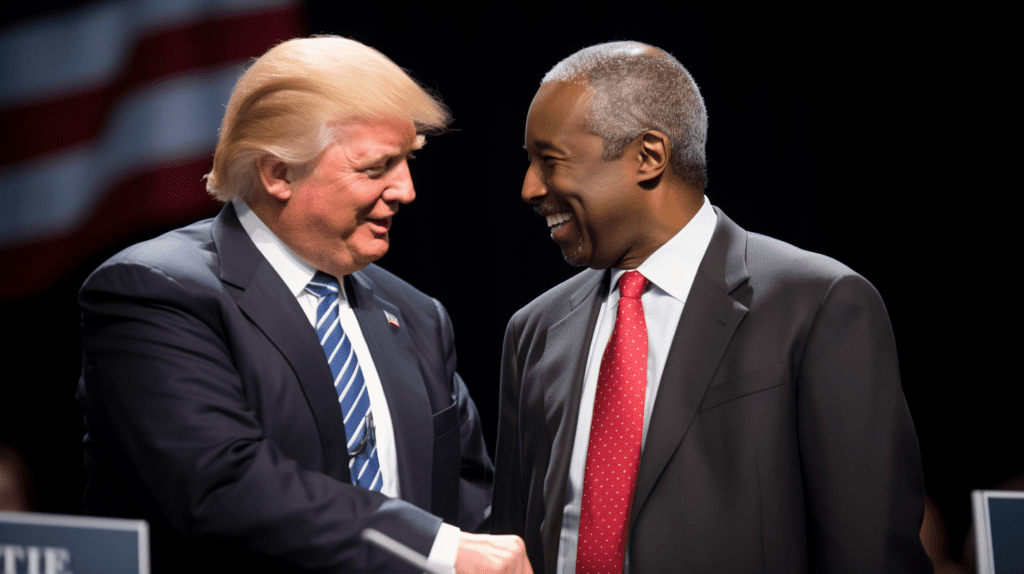
- CBN University — now known as Regent University, the institution was founded by Pat Robertson. It aims to provide a Christian education and has been influential in training leaders who align with Christian nationalist ideologies.
- A Choice Not an Echo — a political pamphlet by Phyllis Schlafly, published in 1964. It has been influential in conservative circles and is often cited by Christian nationalists as a call to action against liberal ideologies.
- Christian Broadcasting Network (CBN) — Founded by Pat Robertson, CBN is a television network with a Christian focus. It has been a significant platform for disseminating Christian nationalist views and influencing American politics.
- Christian Coalition — a political organization founded by Pat Robertson. It aims to mobilize conservative Christians in the U.S. and has been a driving force in the Christian nationalist movement since the 1990s.
- Christian homeschooling movement — advocates for homeschooling as a way to instill Christian values in children. It has gained traction among Christian nationalists who view public education as secular and morally corrupt.
- Christian Satellite Network — a media outlet that broadcasts Christian content. While not overtly nationalist, it serves as a platform for voices that often align with Christian nationalist views.
- J. C. Church — a pastor and political activist who has been involved in promoting Christian nationalist ideologies. He advocates for the integration of Christian principles into American governance.
- Church United — an organization that aims to politically mobilize churches. It has been criticized for promoting a Christian nationalist agenda, particularly in local and state politics.
- Church Voter Lookup — a tool often used by Christian nationalist groups to identify and mobilize Christian voters. It aims to influence elections in favor of candidates who uphold Christian values.
- Claremont Institute — An influential right-wing think tank with fellows who participated in the attempts to overturn the 2020 election, and who have promoted the idea of an American authoritarian “Red Caesar” who might redeem a decadent nation.
- Tom Coburn — Tom Coburn was a U.S. Senator known for his conservative stances. While not explicitly a Christian nationalist, his political ideology often aligned with the movement’s principles.
- Mary Colbert — a Christian author and speaker. She is known for her books that blend Christian teachings with conservative political views, making her a voice in the Christian nationalist sphere.
- Concerned Women for America — a socially conservative Christian women’s activist group. It focuses on issues like abortion and religious freedom and has been influential in promoting Christian nationalist ideologies.
- Conscience and Religious Freedom Division — this division within the U.S. Department of Health and Human Services aims to protect religious freedoms in healthcare. It has been praised by Christian nationalists for upholding Christian values in public policy.
- Conservative Caucus — a political organization that aims to mobilize grassroots conservatives. While not exclusively Christian nationalist, it often aligns with the movement’s goals.
- Kellyanne Conway — a political strategist best known for her role as counselor to President Donald Trump. She has often defended policies that resonate with Christian nationalist ideologies.

- Cornwall Alliance for the Stewardship of Creation — this alliance focuses on environmental stewardship from a Christian perspective. It often opposes mainstream climate science, aligning more closely with the conservative Christian viewpoints of climate change denialism.
- Council for National Policy (CNP) — a secretive organization that brings together influential conservatives, many of whom are Christian nationalists. It aims to shape public policy in line with conservative Christian values.
- Culture Impact Teams (CITs) — grassroots groups often found in churches. They aim to influence local politics and culture in line with Christian nationalist principles.
- Jan Crouch — She was a co-founder of the Trinity Broadcasting Network (TBN), a major Christian television network. TBN has served as a prominent platform for Christian nationalist voices.
- Paul Crouch — also a co-founder of TBN and husband to Jan Crouch. Like his wife, he played a significant role in disseminating Christian content that often aligns with nationalist ideologies.
- Rafael Cruz — Ted Cruz’s father and an American evangelical preacher.
- Ted Cruz — a U.S. Senator from Texas known for his staunch conservative views. He has been a vocal advocate for integrating Christian values into American governance, making him a key figure in the Christian nationalist movement.
- Dr. Kenyn M. Cureton — a Baptist minister and Vice President for Church Ministries at the Family Research Council. He is known for advocating the role of Christianity in American public life, aligning with Christian nationalist ideologies.
- Robert Lewis Dabney — Robert Lewis Dabney was a 19th-century theologian and Confederate Army chaplain. His writings have been cited by modern Christian nationalists as foundational texts for their movement.
- The Daily Signal — a news outlet run by The Heritage Foundation. It often publishes articles that resonate with Christian nationalist and conservative viewpoints.
- Marjorie Dannenfelser — the President of the Susan B. Anthony List, an organization that focuses on electing pro-life candidates. She is a key figure in the Christian nationalist movement.
- Jeff Denham — a former U.S. Representative from California. While not overtly a Christian nationalist, his conservative stances often align with the movement’s principles.
- Betsy DeVos — a former U.S. Secretary of Education known for her advocacy for “school choice” (i.e. allowing parents to use public tax dollars to send their kids to private Christian academies) and Christian education, making her a significant figure in the Christian nationalist movement.

- Richard DeVos — Richard DeVos was an American entrepreneur and co-founder of Amway. He was a major donor to conservative and Christian causes.
- James Dobson — the founder of Focus on the Family, an organization that promotes Christian values in American families. He is a key figure in the Christian nationalist movement.
- Mark Drever — a lesser-known figure in the Christian nationalist movement who has been involved in various Christian organizations.
- Karen Rudolph Drollinger
- Ralph Drollinger — the founder of Capitol Ministries, an organization that aims to evangelize elected officials. He has been criticized for pushing a Christian nationalist agenda, as well as for advocating corporal punishment for children.
- Dinesh D’Souza — a conservative author and filmmaker. While not explicitly a Christian nationalist, his works often resonate with the movement, particularly in his critiques of liberal ideologies.
- Alan P. Dye — a Washington, D.C.-based attorney known for representing conservative and Christian organizations. His legal work often intersects with the goals of the Christian nationalist movement.
- Eagle Forum — Founded by Phyllis Schlafly, the Eagle Forum is a conservative organization that has been instrumental in opposing feminist and liberal policies, often from a Christian nationalist perspective.
- Stuart Epperson — the co-founder of Salem Media Group, a Christian and conservative media company. He has been influential in disseminating Christian nationalist views through various media platforms.
- Equal Rights Amendment — a proposed amendment to the U.S. Constitution aimed at guaranteeing equal legal rights regardless of sex. It has been opposed by some Christian nationalists who argue it undermines traditional family values.
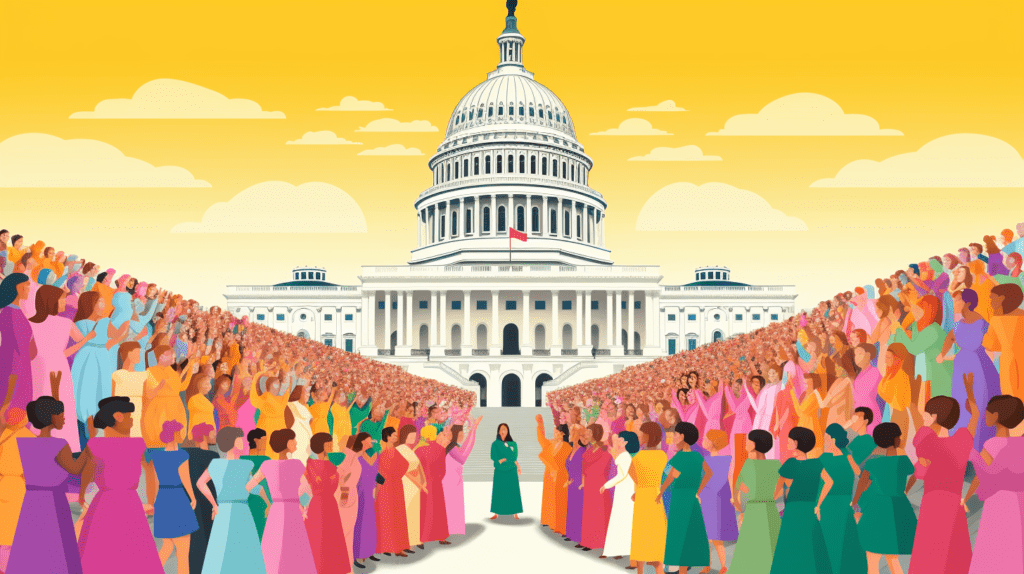
- Frank Erb — serves as a minister to California State Capitol leaders and is associated with Capitol Ministries. He aims to integrate Christian principles into governance, aligning with Christian nationalist ideologies.
- Tony Evans — a pastor and author who focuses on building strong Christian families. While not overtly a Christian nationalist, his teachings often align with the movement’s principles.
- Jerry Falwell — Jerry Falwell was a prominent televangelist and founder of the Moral Majority, an organization that played a key role in the rise of the Christian right and Christian nationalism.
- Faith & Freedom Coalition — aims to mobilize conservative religious voters and has been a significant force in promoting Christian nationalist ideologies, particularly in electoral politics.
- The Family — Also known as The Fellowship, this organization is a Christian association that has been criticized for its secretive nature and influence on American politicians. It is often associated with Christian nationalist agendas.
- Family Christian Academy (FCA) — a private religious academy offering a “Christ-centered” curriculum and the teaching of a “biblical worldview.”
- Family Life Radio — Family Life Radio is a Christian radio network broadcasting contemporary Christian music and Christian talk radio programming across the United States.
- Family Policy Alliance — The Family Policy Alliance is a conservative Christian organization in the United States that advocates for various policy issues from a faith-based perspective. It focuses on issues such as religious freedom, anti-abortion policies, and the promotion of the traditional family structure (aka Strict Father Morality).
- Family Policy Councils — Family Policy Councils in the United States are typically conservative organizations at the state level that focus on lobbying and advocating for policies they believe support family values. These councils often address issues like gay marriage, parental rights, religious liberty, and anti-abortion initiatives.
- Family Research Council (FRC) — The FRC is a prominent conservative Christian group that advocates for policies they believe uphold traditional family values. It is influential in right-wing politics, often shaping public debate on social issues.
- Family Worship Center — Associated with the ministry of televangelist Jimmy Swaggart, the organization reflects his blend of evangelical worship and conservative family values.
- Fellowship Foundation — Also known as “The Fellowship” or “The Family,” this is a religiously-oriented group that operates the National Prayer Breakfast in Washington, D.C. It is known for its influence on American politics, fostering relationships among political, business, and religious leaders.
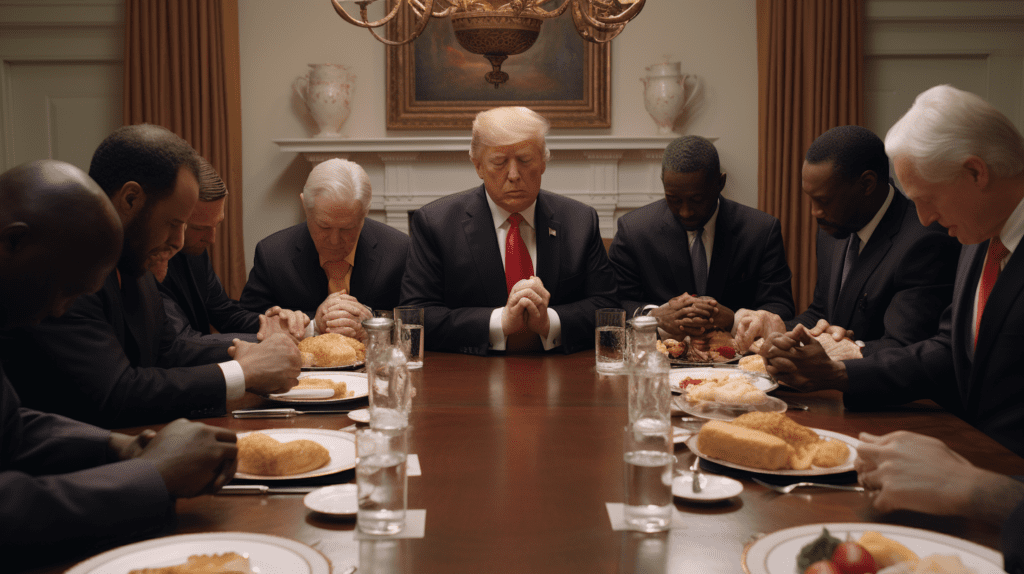
- Nate Fischer — A Texas-based member of the clandestine Christian nationalist fraternal order the Society for American Civic Renewal (SACR).
- Reverend Wilber Fisk — An influential 19th-century Methodist educator and theologian, remembered for his strong advocacy for Methodist doctrine and education. His work has inspired many current Christian nationalist groups and ideologies.
- Tami Fitzgerald — Fitzgerald is a contemporary figure known for her conservative activism, particularly in North Carolina, where she has been a prominent voice on issues like gay marriage and gender, reflecting broader right-wing advocacy trends.
- Florida Family Action — This is an organization that works at the state level in Florida, engaging in grassroots lobbying and electoral involvement to promote conservative values on social issues.
- Florida Family Action PAC — The political action committee of the Florida Family Action, this group supports candidates and initiatives in Florida that align with its conservative, family-centered policy goals.
- Florida Family Policy Council — This council operates in Florida, advocating for conservative social policies. It’s part of a network of state-based conservative policy groups with similar aims.
- Focus on the Family — A well-known evangelical organization based in Colorado Springs, it promotes conservative policies related to family structure and parenting, and is a major producer of Christian-themed media content.
- Foster Friess — Friess was a prominent conservative donor and philanthropist, who financially supported various Republican candidates and causes aligned with right-wing politics until his death in 2021.
- Free Congress Foundation — Founded by Paul Weyrich, this right-wing think tank historically has been instrumental in promoting conservative legislative agendas and played a pivotal role in the development of conservative strategies and policies.
- Lynn Friess — Lynn Friess is the widow of Foster Friess and has continued to be active in philanthropy and conservative causes, supporting various initiatives that align with her and her late husband’s values, particularly in the realms of education, Christian outreach, and family services.
- Jim Garlow — A pastor and author, Garlow is a notable figure in conservative Christian circles, known for his advocacy on traditional marriage and anti-abortion issues, and has been a key influence in the intersection of faith and politics.
- Rosemary Schindler Garlow — A speaker and activist, she is married to Jim Garlow, and is also a distant relative of Oskar Schindler. She is involved in Christian ministry work and advocacy, often in conjunction with her husband’s activities.
- W. Barry Garrett
- Godspeak Calvary Chapel — Non-denominational church in California that gained attention in conservative media for its defiance of public health orders during the COVID-19 pandemic.
- Barry Goldwater — Known as the “father of modern conservatism,” Goldwater was a five-term U.S. Senator from Arizona and the 1964 Republican nominee for President. His libertarian-leaning conservative philosophy laid the foundation for the conservative resurgence in the following decades.
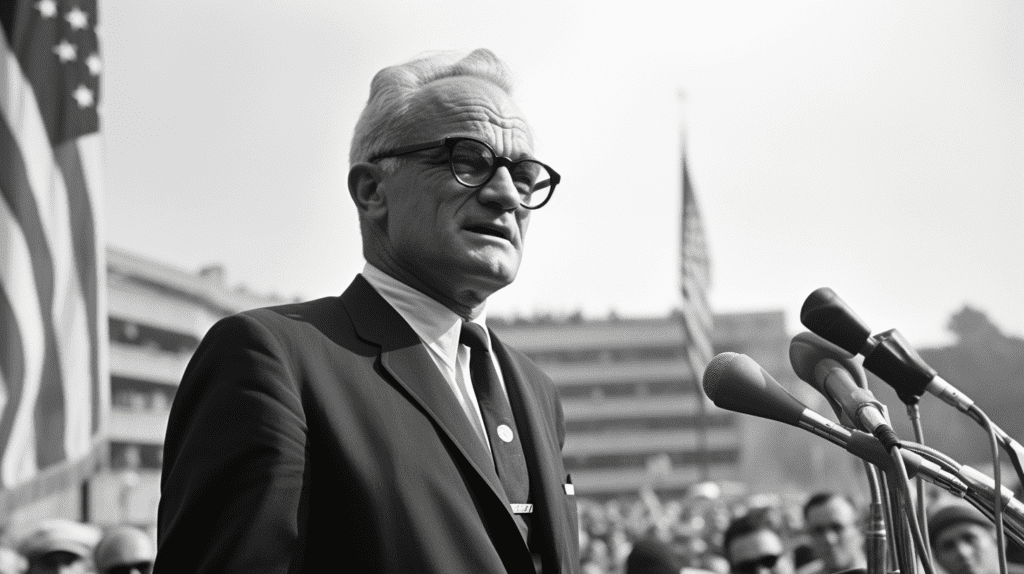
- Peggy Goldwater — As the wife of Barry Goldwater, Peggy Goldwater was a supportive figure in his political career. While less politically active herself, she played a role in the personal side of the conservative movement during her husband’s career.
- Grace Community Church, Sun Valley — A prominent evangelical church in California, led by Pastor John MacArthur. It is known for its conservative theological stance and has been influential in evangelical Christian circles.
- Billy Graham — Reverend Billy Graham was one of the most influential Christian evangelists of the 20th century, serving as a spiritual advisor to multiple U.S. presidents and preaching to millions globally, with a message that was generally hard-lined conservative.
- The Green family — Best known for founding Hobby Lobby, the Green family is prominent in conservative circles for their Christian faith and legal battles over religious freedom and opposition to certain provisions of the Affordable Care Act.
- Ken Ham — a young-earth creationist and the founder of Answers in Genesis, the Creation Museum, and the Ark Encounter. Ham is a significant figure in promoting a literal interpretation of the Bible and opposing evolutionary theory, which is often referenced in conservative Christian education debates.
- Abraham Hamilton III — host of American Family Radio‘s “Hamilton Corner” who described the 2017 mass shooting in Las Vegas as “Satan’s work” that was “immune to legislation.” He went on to claim that the Democrats were “exploiting” the victims by calling for hearings on gun control.
- Mark Harris
- Kristan Hawkins
- Charles Haywood — A self-described “industrialist” and Chicago-educated attorney who helped to incorporate the secretive patriarchal Society for American Civic Renewal (SACR), and sits on its board.
- Carl F. H. Henry — a prominent American evangelical theologian and a key figure in the neo-evangelical movement, advocating for evangelical engagement with broader culture while maintaining orthodox Christian theology who played a vital role in shaping evangelical thought in the 20th century. Henry’s influence continues through his foundational role in institutions like Fuller Theological Seminary and Christianity Today magazine.
- Heritage Academy — Heritage Academy is a private Christian school known for its emphasis on providing education based on Christian principles and traditional academic subjects. It aligns with Christian nationalist ideologies in its approach to education, integrating conservative Christian values and teachings into its curriculum and school culture.

- Heritage Action — Heritage Action for America is a conservative advocacy organization and the political action sister organization of the Heritage Foundation. It focuses on promoting conservative policies and legislation, and while not exclusively Christian nationalist, its activities often align with Christian nationalist principles, advocating for policies rooted in conservative Christian values.
- Heritage Foundation — a prominent conservative think tank in Washington, D.C., established in 1973. It focuses on promoting conservative public policies based on principles like free enterprise, limited government, individual freedom, traditional values, and strong national defense. The foundation has significantly influenced American politics and policy through research, policy recommendations, and influencing decision-makers, making it a key player in shaping U.S. conservative policy.
- Eric Heubeck — Eric Heubeck is known for his involvement in conservative political strategy, notably for authoring “The Integration of Theory and Practice: A Program for the New Traditionalist Movement,” which outlines strategies for conservative cultural renewal.
- Hugh Hewitt — Hugh Hewitt is an American radio talk show host, lawyer, academic, and author, known for his nationally syndicated conservative talk radio show and his contributions as a political commentator.
- Jack Hibbs — Jack Hibbs is a prominent evangelical pastor and founder of Calvary Chapel Chino Hills in California, known for his teachings and influence in Christian conservative circles.
- Rob Hilarides
- The Hillsdale Collegian — The Hillsdale Collegian is the student newspaper of Hillsdale College in Michigan, known for its coverage of campus events and its emphasis on conservative perspectives in higher education.
- Kay Hiramine
- A. A. Hodge — Archibald Alexander Hodge (1823–1886) was an American Presbyterian theologian and principal of Princeton Seminary, recognized for his contributions to theological education and the Presbyterian Church.
- John Henry Hopkins
- Mike Huckabee — Mike Huckabee is an American politician, Christian minister, author, and commentator, who served as the 44th governor of Arkansas and unsuccessfully sought the Republican presidential nomination in 2008 and 2016.

- Sarah Huckabee Sanders — Currently the sitting governor of Arkansas, she is the daughter of Mike Huckabee and the former Press Secretary of the Trump administration.
- Humanitarian International Services Group (HISG) — HISG is an organization known for its humanitarian efforts with a Christian perspective, often involved in providing aid and support in crisis situations. Their work intertwines humanitarian aid with Christian values, which aligns them with aspects of Christian nationalism.
- Nelson Bunker Hunt — Nelson Bunker Hunt was an American oil company executive known for his significant involvement in conservative Christian movements. He financially supported various Christian nationalist causes and was a major donor to conservative Christian organizations.
- Institute on Religion and Democracy — The Institute on Religion and Democracy is a conservative Christian think tank that focuses on promoting their interpretation of Christian ethics within policy and society. They have been influential in advocating for Christian nationalist ideals within the United States.
- Larry Jackson
- David Jeremiah — David Jeremiah is a prominent Christian pastor and televangelist known for his evangelical teachings. While his ministry primarily focuses on evangelical Christianity, it occasionally intersects with Christian nationalist ideology.
- Bob Jones Sr. — Bob Jones Sr. was an American evangelist and the founder of Bob Jones University, a private, non-denominational evangelical university. The university and Jones himself have been associated with conservative Christian ideologies, some of which align with Christian nationalism.
- Bob Jones University — Bob Jones University is a private, non-denominational evangelical Christian university known for its conservative cultural and religious values. Historically, it has been associated with and influential in promoting conservative Christian ideologies, as well as notorious for continuing to support segregation — and remaining a segregated institution — until 1971.

- Kingdom Warriors — Kingdom Warriors is a term that can refer to various Christian groups or movements that advocate for applying Christian principles to societal and political life. These groups often align with Christian nationalist ideologies in their efforts to influence culture and politics according to their religious beliefs.
- KMMJ – KMMJ is a Christian radio station known for broadcasting content that aligns with evangelical Christian values.
- C. Everett Koop — C. Everett Koop was an American pediatric surgeon and public health administrator, known for serving as the Surgeon General of the United States, and a devout Christian.
- Skyler Kressin — A tax consultant based in Coeur d’Alene, Idaho who plays a central administrative role in the secret patriarchal Christian order of the Society for American Civic Renewal (SACR).
- Ku Klux Klan — The Ku Klux Klan is a white supremacist hate group with a long history of violent extremism. Their ideology often misappropriates Christian symbols and rhetoric to promote their racist agenda.

- Beverly LaHaye — Beverly LaHaye is a Christian conservative activist and founder of Concerned Women for America, a group known for promoting Christian conservative policies. Her work often intersects with Christian nationalist ideologies, advocating for policies based on conservative Christian values.
- Tim LaHaye — Tim LaHaye was an evangelical Christian minister and author, best known for the “Left Behind” series about the End Times and world-ending apocalypse. His works and ministry often promoted a conservative Christian worldview, aligning at times with Christian nationalist ideologies.
- Wayne LaPierre — Wayne LaPierre was the CEO and executive vice president of the National Rifle Association (NRA) for many years. While primarily focused on gun rights advocacy, his influence occasionally intersects with Christian nationalist groups that share common conservative values.
- Bill Lee — Bill Lee, as the Governor of Tennessee, has implemented policies and supported legislation that align with conservative Christian values. His governance reflects aspects of Christian nationalist ideology, emphasizing traditional Christian values in policy-making.
- Leonard Leo — Leonard Leo is a prominent conservative legal activist, known for his influence in the Federalist Society and the composition of today’s Supreme Court. He plays a significant role in promoting conservative judges, some of whom align with Christian nationalist principles.
- Mark Levin — Mark Levin is a conservative commentator and radio host, known for his advocacy of conservative policies. While his primary focus is on conservative politics, his viewpoints sometimes resonate with Christian nationalist ideologies.
- Liberty University — Liberty University is a private evangelical Christian university founded by Jerry Falwell Sr. The university is a major hub for conservative Christian education and activism.
- LifeWay Research — LifeWay Research is an evangelical Christian research group that provides research and resources for churches. Christian nationalist ideologies guide their work in terms of influencing church and societal policies.
- Rush Limbaugh — Rush Limbaugh was a conservative radio host and commentator, known for his influential role in conservative media. His advocacy for conservative politics intersected with Christian nationalist ideologies.

- Elias Loera
- Nathan Lord
- Dave Louden
- Barry Loudermilk — Barry Loudermilk is a U.S. Congressman known for his conservative Christian views. His legislative actions and public statements often reflect Christian nationalist ideologies, advocating for policies based on conservative Christian principles.
- John MacArthur — John MacArthur is a prominent evangelical pastor and author, known for his conservative theological views.
- Rachel MacNair — Rachel MacNair is known for her work in the pro-life movement, with a focus on consistent life ethics. While her work is primarily in the anti-abortion arena, it sometimes intersects with Christian nationalist ideologies in terms of advocating for policies based on Christian ethics.
- Danielle Madison
- March for Life — The March for Life is an annual event advocating against abortion in the United States. While its primary focus is on anti-abortion activism, the event often draws support from Christian nationalist groups, advocating for policies aligned with conservative Christian values.
- Ed McAteer — Ed McAteer was known as a leading figure in the Religious Right movement and was influential in mobilizing conservative Christians into political activism. His efforts significantly contributed to the alignment of evangelical Christians with conservative and Christian nationalist ideologies.
- The Moral Majority — The Moral Majority was a prominent American political organization associated with the Christian right, founded by Jerry Falwell in 1979. It played a significant role in mobilizing conservative Christians into political action, promoting policies aligned with Christian nationalist ideologies.
- Jeanne Mancini — Jeanne Mancini is known for her role as the President of the March for Life, a major anti-abortion organization in the U.S. Her leadership focuses on advocating for anti-abortion policies, often resonating with Christian nationalist principles.
- Manhattan Declaration — The Manhattan Declaration is a Christian manifesto issued in 2009, emphasizing the sanctity of life, traditional marriage, and religious freedom. It is supported by various Christian leaders and aligns with Christian nationalist ideologies in its advocacy for public policies based on Christian ethics.
- Rob McCoy — Rob McCoy is a pastor and former city council member known for his conservative Christian views. His public stance often aligns with Christian nationalist ideologies, emphasizing the integration of Christian values in governance and society.
- Mark Meadows — Mark Meadows is a former U.S. Congressman and White House Chief of Staff for Donald Trump, known for his conservative and Christian nationalist views. He has been influential in promoting policies that align with Christian nationalist ideologies.
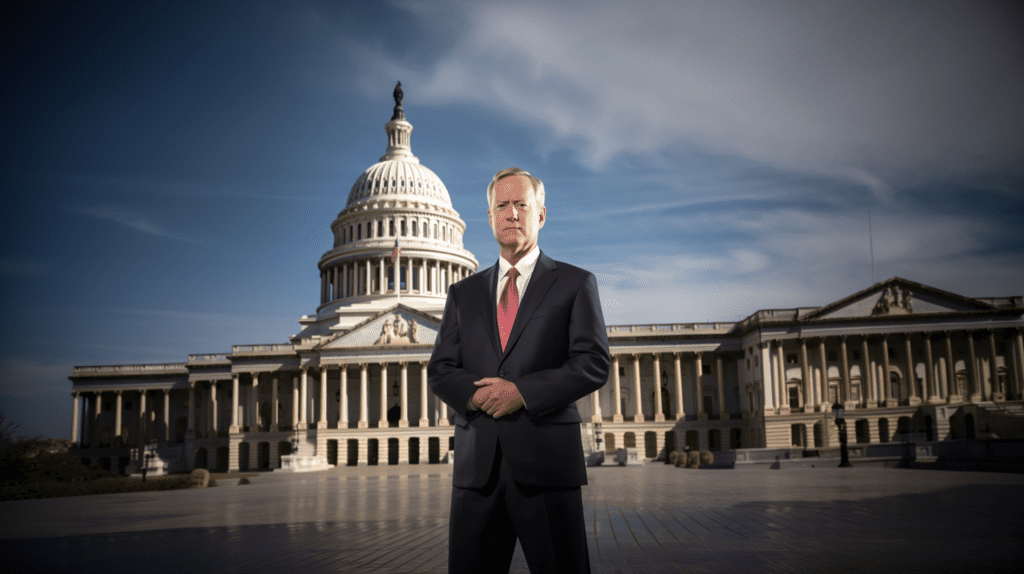
- Mark Meckler — Tea Party activist and co-funder of Convention of States.
- Janet Mefferd — Janet Mefferd is a conservative Christian radio host and commentator. Her broadcasts often emphasize conservative Christian viewpoints, aligning with Christian nationalist ideologies in discussions on culture and politics.
- Roy Moore — Roy Moore is a former Alabama Supreme Court Chief Justice known for his staunch conservative Christian views. His public and professional life has been marked by advocacy for Christian nationalist principles, particularly in legal and political contexts — as well as by controversy, when he was credibly accused by several women of having pursued a romantic relationship with him when they were teenagers and he was in his 30s.
- Museum of the Bible — The Museum of the Bible in Washington, D.C., is dedicated to the history, narrative, and impact of the Bible. While it presents as an educational institution, its exhibits often align with conservative Christian perspectives, resonating with Christian nationalist ideologies.
- The Naked Communist — “The Naked Communist” is a book by Cleon Skousen, published in 1958, presenting a critique of communism and its perceived threats to Christian and American values. The book has been influential in conservative and Christian nationalist circles, advocating for anti-communist and conservative Christian ideals.
- Penny Young Nance — Penny Young Nance is the CEO and President of Concerned Women for America, a Christian conservative advocacy group. Her leadership focuses on promoting policies and viewpoints aligned with Christian nationalist ideologies.
- National Center for Constitutional Studies — The National Center for Constitutional Studies is an organization known for promoting a conservative interpretation of the U.S. Constitution. Its work often aligns with Christian nationalist principles, advocating for governance and policies based on conservative Christian values.
- National Christian Foundation — The National Christian Foundation is one of the largest Christian grant-making foundations, supporting a wide range of Christian causes and organizations. Some of its funding goes to groups and initiatives that align with Christian nationalist ideologies.
- National Conservative Student Conference — This conference, organized by the Young America’s Foundation, gathers conservative students from across the U.S. to engage with conservative ideas, including those aligning with Christian nationalist ideologies.

- National Federation of Republican Women — This organization is dedicated to empowering and mobilizing women in the Republican Party. Its activities sometimes intersect with Christian nationalist ideologies, particularly in advocating for conservative Christian policies.
- National Right to Life Committee — The National Right to Life Committee is the oldest and largest national anti-abortion organization in the United States, advocating for pro-life policies. Its advocacy often aligns with Christian nationalist ideologies in its approach to legislative and cultural issues.
- Richard John Neuhaus — Richard John Neuhaus was a prominent Catholic priest and theologian, known for his influence in the realm of religion and public life. His work often intersected with Christian nationalist ideologies, advocating for the integration of Christian values into public policy.
- New Christian Right — The New Christian Right is a politically and socially conservative Christian movement that emerged in the late 20th century. This movement is characterized by its advocacy for Christian nationalist ideologies, emphasizing the role of Christianity in American public life.
- Kristi Noem — Kristi Noem, as the Governor of South Dakota, is known for her conservative policies and alignment with Christian nationalist ideologies. Her governance and public statements often reflect a strong emphasis on traditional Christian values.
- Gary North — Gary North is an economist, historian, and writer known for his advocacy of Christian Reconstructionism, a theological perspective that advocates the adoption of Biblical law in the United States.
- North Carolina Family Policy Council — The North Carolina Family Policy Council is a conservative Christian organization focused on promoting family values and policies aligned with conservative Christian ethics. Their advocacy often intersects with Christian nationalist ideologies, emphasizing traditional Christian views in public policy.
- Michael Novak — Michael Novak was a Catholic philosopher, journalist, and diplomat, known for his writings on capitalism, religion, and democracy. His work, blending Christian theology with democratic capitalism, sometimes resonated with Christian nationalist thought.
- Old Time Gospel Hour — The Old Time Gospel Hour was a Christian radio and television ministry founded by Jerry Falwell Sr. This program was instrumental in spreading evangelical Christian teachings and often intersected with Christian nationalist ideologies.
- John M. Olin — John M. Olin was an industrialist and philanthropist, known for funding conservative causes through the John M. Olin Foundation. His contributions significantly supported academic and political endeavors aligned with conservative and Christian nationalist ideologies.
- Organicgirl — Brand of organic lettuce ultimately owned by a right-wing billionaire
- Joel Osteen — Joel Osteen is a prominent televangelist and pastor of Lakewood Church, known for his motivational speaking and prosperity gospel teachings.
- Sarah Palin — Sarah Palin, former Governor of Alaska and Vice Presidential candidate, is known for her conservative Christian views. Her political career and public statements often reflect Christian nationalist ideologies, emphasizing the integration of conservative Christian values into American politics.

- “Pastors Briefings”
- Mike Pence — Mike Pence, former Vice President of the United States, is known for his conservative Christian beliefs and policies. His political career is characterized by advocacy for policies that align with Christian nationalist ideologies.
- Pentecostals — Pentecostalism is a Christian movement known for its emphasis on the Holy Spirit, spiritual gifts, and vibrant worship. While diverse in its expressions, some segments of the Pentecostal movement intersect with Christian nationalist ideologies, particularly in advocating for the integration of Christian beliefs into public life.
- Sonny Perdue — Sonny Perdue, former Governor of Georgia and U.S. Secretary of Agriculture, is known for his conservative policies and Christian beliefs. His political career has included support for policies that align with Christian nationalist ideologies.
- Tony Perkins — Tony Perkins is the president of the Family Research Council, a conservative Christian group known for its advocacy on social and family issues. His leadership and activism are closely aligned with Christian nationalist ideologies, advocating for policies based on conservative Christian values.
- Rick Perry — Rick Perry, former Governor of Texas and U.S. Secretary of Energy, is known for his conservative Christian beliefs and political career reflecting support for policies that align with Christian nationalist ideologies. He is famous for a gaffe during the Republican presidential primary debate in 2011 where he claimed he would abolish 3 federal agencies but could only name 2 of them.
- Howard Phillips — Howard Phillips was a conservative political activist, known for founding the Constitution Party, which advocates for a government based on biblical principles. His political ideology and activism were closely aligned with Christian nationalist principles.
- Buddy Pilgrim
- Mike Pompeo — Mike Pompeo, former U.S. Secretary of State and CIA Director, is known for his conservative Christian views. His political career and public statements often reflect Christian nationalist ideologies, emphasizing the importance of Christian values in American foreign and domestic policy.

- Art Pope — Art Pope is a businessman and political donor known for his support of conservative causes and candidates in North Carolina and nationally.
- Reverend J. C. Postell
- POTUS Shield — POTUS Shield is a collection of Charismatic Christian leaders who focus on intercessory prayer and prophecy for the United States government and leadership. It aligns with Christian nationalist ideologies, particularly in its support for leaders who uphold conservative Christian values.
- The Power of the Positive Woman — “The Power of the Positive Woman” is a book by Phyllis Schlafly, advocating for conservative Christian views on women’s roles. The book has been influential in the Christian right, aligning with Christian nationalist ideologies in promoting traditional gender roles.
- Dennis Prager — Dennis Prager is a conservative radio talk show host and writer known for his religious and conservative viewpoints. His work often resonates with Christian nationalist ideologies, advocating for the integration of Judeo-Christian values into American life.
- Praise Network — The Praise Network is a group of Christian radio stations broadcasting religious content, often including evangelical and conservative Christian teachings. Its programming sometimes aligns with Christian nationalist ideologies in promoting a Christian worldview.
- Tom Price — Tom Price is a former U.S. Representative and Secretary of Health and Human Services, known for his conservative policies. His political career has occasionally intersected with Christian nationalist ideologies, particularly in the realm of health policy and religious freedom.
- Erik Prince — Erik Prince, the founder of the private security and paramilitary firm Blackwater, is known for his conservative Christian views and his support for conservative causes. His views and activities sometimes align with Christian nationalist ideologies, particularly in the context of military and security affairs. He is the brother of Betsy DeVos, Michigan industrialist and Secretary of Education in the Trump administration.

- Scott Pruitt — Scott Pruitt, former Administrator of the Environmental Protection Agency, is known for his conservative Christian beliefs. His tenure at the EPA ended after less than 2 years, when he resigned as a result of a growing mass of corruption scandals and ethical violations.
- Quiverfull movement — The Quiverfull movement is a Christian ideology advocating for large families and traditional gender roles, viewing children as a blessing from God.
- Oleg Rachkovski
- Ronald Reagan — Ronald Reagan, the 40th President of the United States, was known for incorporating conservative Christian values into his policies and rhetoric. His presidency is often cited as aligning with Christian nationalist ideologies in promoting conservative Christian values in American governance.
- Ralph Reed — Ralph Reed is the founder of the Faith and Freedom Coalition and was the former executive director of the Christian Coalition. He is a significant figure in Christian nationalist circles, advocating for conservative Christian values in politics.
- Regent University — Founded in 1977 as CBN University by televangelist Pat Robertson in Virginia Beach, Virginia, Regent University is a private Christian university that stands out for its Christian ideology, pedagogy, and history.
- Carolyn Richards
- Road to Majority Conference — The Road to Majority Conference is an annual event hosted by the Faith and Freedom Coalition, aimed at mobilizing conservative Christians in politics. The conference aligns with Christian nationalist ideologies, focusing on advancing conservative Christian values in governance.
- Pat Robertson — Pat Robertson was a televangelist, founder of the Christian Broadcasting Network (CBN), and former presidential candidate. He is a major figure in Christian nationalist circles, known for his advocacy of conservative Christian values in American society and politics.

- Jim Robison
- Roe v. Wade — Roe v. Wade is the landmark 1973 Supreme Court decision that legalized abortion nationwide. It had been a central focus of opposition in Christian nationalist ideologies, which they successfully advocated for its reversal based on conservative Christian ethics.
- Rousas Rushdoony — Rousas John Rushdoony was a Calvinist philosopher, historian, and theologian, known as the father of Christian Reconstructionism. His teachings, advocating for the application of biblical law to all areas of life, have significantly influenced Christian nationalist thought.
- Karl Rove — Karl Rove, a political consultant and strategist, is known for his role in shaping modern conservative politics, particularly during the presidency of George W. Bush.
- John Rustin
- SAGE Cons — SAGE Cons (Spiritually Active, Governance Engaged Conservatives) refers to a segment of conservative Christians who are highly engaged in the political process.
- Salem Media Group / Salem Radio Group — The Salem Radio Group is a leading broadcaster of Christian and conservative content, operating numerous radio stations across the United States. Its programming often aligns with Christian nationalist ideologies, promoting conservative Christian viewpoints.
- Richard Mellon Scaife — Richard Mellon Scaife was an American billionaire and publisher, known for funding conservative causes and publications. His philanthropy significantly influenced the growth of conservative and, at times, Christian nationalist ideologies in American politics.
- Jeff Sessions — Jeff Sessions, former U.S. Attorney General and Senator, is known for his conservative and often Christian-oriented political stance. His policies and public statements often resonate with Christian nationalist ideologies, particularly in the areas of immigration and religious liberty.

- Francis Schaeffer — Francis Schaeffer was an influential evangelical theologian and philosopher, known for his writings on Christianity and culture. His work laid a foundation for the Christian right and indirectly influenced Christian nationalist ideologies.
- Phyllis Schlafly — Phyllis Schlafly was a conservative activist and author, known for her opposition to the feminist movement and her advocacy for conservative Christian values. She was a key figure in the rise of the Christian right, which intersects with Christian nationalist ideologies.
- Alan Sears — Alan Sears is an attorney and founder of the Alliance Defending Freedom, an organization known for its conservative Christian legal advocacy. His work often aligns with Christian nationalist ideologies, especially in legal battles over religious freedom and traditional values.
- Jay Sekulow — Jay Sekulow is Chief Counsel for the American Center for Law and Justice (ACLJ), known for his legal advocacy on behalf of conservative Christian causes. His work frequently intersects with Christian nationalist ideologies in defending religious liberties and conservative values in the legal sphere.
- W. Cleon Skousen — W. Cleon Skousen was an American conservative author and lecturer, known for his work on anti-communism and the Constitution. His writings have been influential in conservative and Christian nationalist circles, advocating for a conservative interpretation of American history and governance.
- Society for American Civic Renewal (SACR) — A secretive, men-only Christian nationalist group in the US with close ties to the Claremont Institute and a membership roster predicated on wealth and power. The group’s ideology is tied to strains of white supremacy and government takeover.
- SonLife Broadcasting Network (SBN) — SonLife Broadcasting Network is a Christian television network run by evangelist Jimmy Swaggart. Its programming focuses on evangelical Christian content and promoting a conservative Christian worldview.
- SonLife Radio Network — SonLife Radio Network, part of Jimmy Swaggart Ministries, broadcasts Christian programming with a focus on evangelical teachings and music.

- Springs Community Church
- Horatio Robinson Storer — Horatio Robinson Storer was a 19th-century physician known for his campaign against abortion and his contributions to the field of gynecology. His historical role intersects with Christian nationalist ideologies in terms of advocating for conservative Christian morals in medical ethics.
- R.J. Rushdoony — Rousas John Rushdoony was a theologian and philosopher, known as a foundational figure in the Christian Reconstructionism movement, advocating for applying Biblical law to all aspects of society. His ideology significantly influenced Christian nationalist thought.
- Southern Baptist Convention — The southern Baptists split with the northern Baptists in 1845 over the issue of slavery.
- Southern Presbyterian Church — The Southern Presbyterian Church historically refers to Presbyterian denominations in the American South, known for their conservative theological views. Their historical and modern stances often align with Christian nationalist ideologies, emphasizing traditional Christian values.
- Southern Strategy — The Southern Strategy was a Republican Party electoral strategy to increase political support among white voters in the South by appealing to racism against African Americans. While not directly a Christian nationalist strategy, it intersects with certain aspects of Christian nationalist politics in its appeal to traditional values and segregation.
- Darla St. Martin — Darla St. Martin is a prominent figure in the pro-life movement, known for her leadership roles in the National Right to Life Committee. Her activism aligns with Christian nationalist ideologies in advocating for anti-abortion policies based on conservative Christian ethics.
- Stop ERA — Stop ERA was a political movement led by Phyllis Schlafly, aimed at opposing the Equal Rights Amendment. This movement was aligned with Christian nationalist ideologies, advocating for traditional gender roles and conservative Christian values.
- Students for Life of America — Students for Life of America is a pro-life organization focused on mobilizing young people against abortion. Their activism often intersects with Christian nationalist ideologies, emphasizing the alignment of conservative Christian values with anti-abortion advocacy.
- Susan B. Anthony List — The Susan B. Anthony List is a non-profit organization that seeks to reduce and ultimately end abortion in the U.S. by supporting pro-life politicians. Its mission aligns with Christian nationalist ideologies in advocating for policies based on conservative Christian ethics.
- Donnie Swaggart — Donnie Swaggart is an evangelist and pastor, part of Jimmy Swaggart Ministries, known for his evangelical teachings.
- Gabriel Swaggart — Gabriel Swaggart is a pastor and television host, part of the Swaggart family’s evangelical ministry. His work, like that of other family members, often aligns with conservative Christian values, occasionally intersecting with Christian nationalist ideologies.
- Jimmy Swaggart — Jimmy Swaggart is a well-known Pentecostal evangelist and founder of Jimmy Swaggart Ministries, including the SonLife Broadcasting Network. His ministry, marked by traditional evangelical teachings, sometimes aligns with Christian nationalist ideologies in promoting conservative Christian values.

- Jimmy Swaggart Bible College (JSBC) — Jimmy Swaggart Bible College is an educational institution part of Jimmy Swaggart Ministries, focused on training individuals for ministry work with an evangelical Christian perspective.
- Jimmy Swaggart Telecast — The Jimmy Swaggart Telecast is a Christian television program led by evangelist Jimmy Swaggart, focusing on evangelical preaching and worship.
- Bruce Taylor
- Jeff Taylor
- Steve Taylor
- Taylor Farms
- Thomas Road Baptist Church — Thomas Road Baptist Church, founded by Jerry Falwell Sr., is a significant megachurch in Lynchburg, Virginia, known for its evangelical Christian teachings. The church has historically been associated with the Christian right and Christian nationalist ideologies.
- James Henley Thornwell — James Henley Thornwell was a 19th-century Presbyterian preacher and theologian, known for his conservative theological views and defense of slavery. His teachings have been cited in contexts related to Christian nationalist ideologies, especially in the historical context of the American South.
- Robert Tilton — Robert Tilton is a televangelist known for his prosperity gospel teachings and controversial faith healing practices. His ministry is focused on “individual prosperity.”
- Unity Project
- “Values Bus”
- Values Voters Summit — The Values Voters Summit is an annual political conference hosted by the Family Research Council, known for gathering conservative Christian activists and politicians. The summit aligns with Christian nationalist ideologies, focusing on advancing conservative Christian values in politics.
- Richard Viguerie — Richard Viguerie was a political figure known for pioneering direct mail fundraising for conservative causes. His work has significantly influenced the conservative movement, including aspects that align with Christian nationalist ideologies.
- Scott Yenor — Claremont Institute official and Boise State University professor who is a member of the shadowy Society for American Renewal fraternal order of Christian nationalists.
- Young America’s Foundation — Young America’s Foundation is a conservative youth organization known for promoting conservative ideas among young people. Its activities often intersect with Christian nationalist ideologies, particularly in advocating for conservative and traditional values in education and public life.

- C. Peter Wagner — C. Peter Wagner was a theologian and missiologist, known for his influence in the Charismatic and New Apostolic Reformation movements. His teachings emphasized conservative Christian principles.
- Chester Ward
- Washington Watch
- The Watchmen
- Doug Wead — Doug Wead is a conservative commentator and author known for his involvement in presidential politics. His work, while primarily political, sometimes intersects with Christian nationalist ideologies, particularly in his advocacy for conservative values.
- Well Versed
- Paul Weyrich — Paul Weyrich was a conservative activist and commentator, co-founder of the Heritage Foundation and the Moral Majority. He played a key role in mobilizing the Christian right and influencing Christian nationalist ideologies within American politics.
- Paula White — Paula White is a televangelist and pastor, known for her association with the prosperity gospel and her role as a spiritual advisor to former President Donald Trump. Her ministry, while primarily focused on individual prosperity and spiritual matters, occasionally intersects with Christian nationalist ideologies.
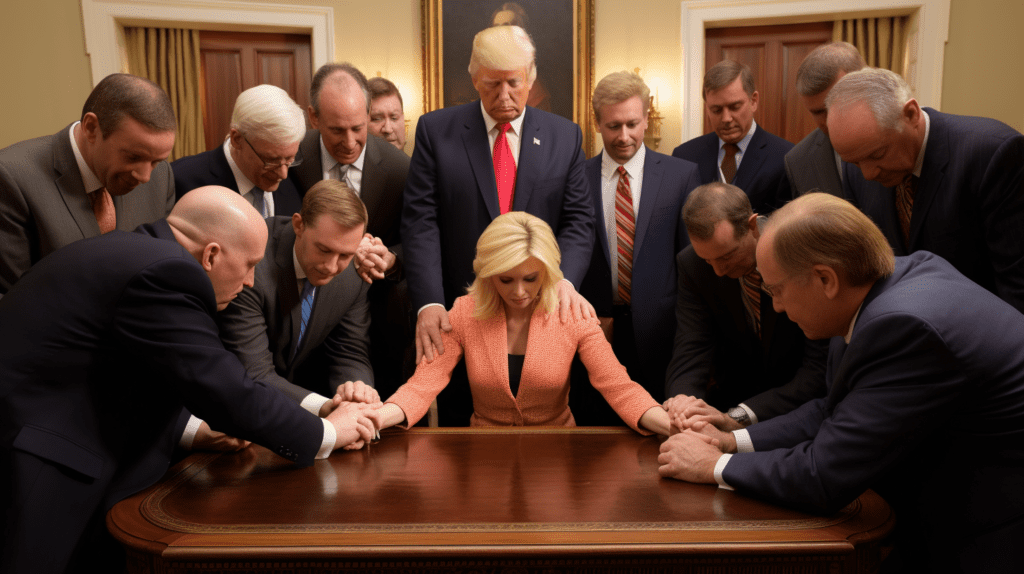
- Donald Wildmon — Donald Wildmon is the founder of the American Family Association, a group known for its conservative Christian advocacy. His work aligns with Christian nationalist ideologies, particularly in promoting conservative Christian values in media and culture.
- Farris Wilks — Farris Wilks is a businessman and conservative political donor, known for his support of Christian and conservative causes. His philanthropy often aligns with Christian nationalist ideologies.
- Dan Wilks — Dan Wilks, alongside his brother Farris, is a businessman and significant donor to conservative and Christian causes. His contributions have influenced the conservative political landscape, occasionally intersecting with Christian nationalist ideologies.
- Ryan P. Williams — President of the Claremont Institute and a board member of the secretive Christian nationalist order seeking to occupy the US government, the Society for American Civic Renewal (SACR). He leads Claremont’s mission in the direction of what he calls a “cold civil war” designed to replace its currency democratically-elected leadership.
- World Ag Expo
- World Congress of Families — The World Congress of Families is an international organization that promotes conservative Christian values related to the family structure. It aligns with Christian nationalist ideologies in advocating for policies based on traditional Christian views of family and morality.
